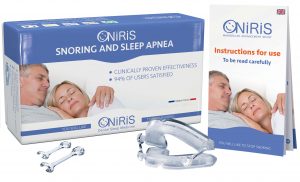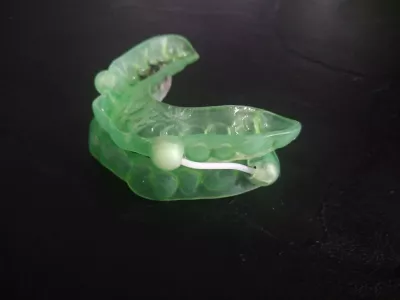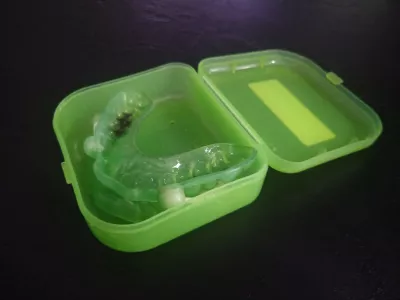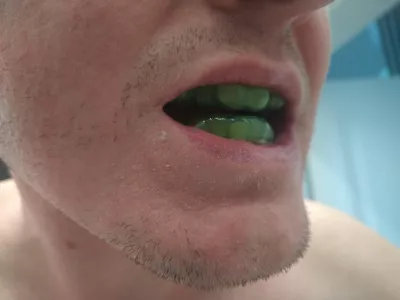Mandibular Advancement Splint For Sleep Apnea: What Is It?
- Splint for extending the lower jaw against snoring and apnea
- Mandibular Advancement Splint for extending the lower jaw: indications and contraindications
- Apnea causes
- Can a dentist help with sleep apnea?
- Indications for the use of splints for extending the lower jaw:
- Contraindications to the use of Mandibular Advancement Splints:
- Effectiveness of Mandibular Advancement Splints against snoring
- The harm of using Mandibular Advancement Splints from snoring
- The splint for extending the lower jaw: features of care
- Nuances to be considered by the patient
- Here's what you need to know:
- Mandibular Advancement Splint price – and accessories
A Mandibular Advancement Splint (or anti snoring orthosis) for extending the lower jaw: principle of operation, rules of care, indications and contraindications
Splint for extending the lower jaw against snoring and apnea
A space retainer is an orthodontic appliance custom made from acrylic or metal by a dentist or orthodontist. The retainer can be removable or cemented into the mouth.
The Mandibular Advancement Splint for snoring is an example of such an invention for snorers. Now let's go in order.
To stop snoring, a Mandibular Advancement Splint – also called an orthodontic retainer – is now actively used, designed to extend the lower jaw. This is not surprising, since such products have been subjected to numerous studies.
Mandibular Advancement Splint for extending the lower jaw: indications and contraindications
People do not always realize how dangerous snoring and sudden awakening from sleep in the middle of the night are. They are caused by sleep apnea - temporary systematic stops in breathing.
Since awakenings occur several times a night, a disturbance in night sleep occurs and, as a result, a person wakes up awake, lethargic and tired. Respiratory arrest usually lasts about 10-30 seconds. But, if in the end we add up all the seconds of holding the breath for the night, then we get a rather long time of oxygen starvation of the brain and can be about 60% of the total time of night sleep.
All this ultimately leads to serious damage to human health. This diagnosis must be established by a specialist after the necessary procedure - polysomnography, which consists in long-term registration and analysis of some parameters during sleep. After the diagnosis of sleep apnea, the patient needs to undergo a full examination and consult a cardiologist and ENT.
According to statistics, men suffer from this ailment more often than women. However, in women, the risk of such disorders increases during menopause. Despite the prevalence of this disease, there are currently effective ways to combat it.
The method and tactics of treatment largely depend on the severity of sleep apnea. Usually, at the initial stages, doctors try to adjust nutrition and physical activity, use various exercises for the nasopharynx. In more difficult situations, when this does not help, dental splints and CPAP therapy are used.
Apnea causes
Sleep apnea is a rather serious disorder that leads to negative consequences. In patients with this diagnosis, the tongue and pharynx are in a relaxed position during sleep, thereby blocking the penetration of air into the respiratory tract. The brain receives a signal to wake up and the person suddenly takes in air with his mouth and snores. This can be repeated up to 600 times per night.
Such sleep disturbance for a long time can ultimately lead to seconds of chronic lack of sleep and fatigue, weakening of concentration, increased blood pressure, heart disease, bronchial asthma and more. Sleep apnea can be caused by diabetes mellitus and sexual dysfunction. Therefore, it is very important to be examined by specialists and identify the original cause, and then prescribe the appropriate treatment.
Can a dentist help with sleep apnea?
One way to combat apnea is to use a Mandibular Advancement Splint which locks the airway open by extending the mandible and tongue.
This method has been used for a long time and has proven to be highly effective. For the first time, studies with such tires were carried out in Germany by Professor Karlheinz Meier-Ewert.
Officially, this method of treatment was presented to the public in 1984. Later, the method with the use of dental splints became widely used in other countries. In 2007, the Germans published a report stating that the use of dental splints significantly reduces the amount of apnea, eliminates daytime sleepiness and has a beneficial effect on the human condition.
Indications for the use of splints for extending the lower jaw:
- systematic sleep apnea for a long time;
- apnea mild to moderate;
- cases when for some reason it is impossible to use CPAP therapy as treatment or is rejected;
- cases when other methods did not give the desired result.
Contraindications to the use of Mandibular Advancement Splints:
- children's age during the entire period of growth and formation of the jaw;
- insufficient number of teeth to attach the splint;
- inflammatory processes in the oral cavity;
- limited mouth opening;
- frequent sinusitis;
- diseases of the oral cavity that require surgical intervention;
- mental illness.
Effectiveness of Mandibular Advancement Splints against snoring
To stop snoring, an orthodontic retainer is now actively used, designed to extend the lower jaw. This is not surprising, since such products have been subjected to numerous studies.
During the study, it was possible to establish that they:
- reduce the volume, frequency and duration of snoring;
- noticeably reduce the number of respiratory stops during sleep;
- significantly reduce the number of micro-awakenings;
- effectively reduce the level of drowsiness in patients;
- help increase oxygen levels;
- splints help to normalize blood pressure;
- significantly reduce mortality from cardiovascular disease;
- significantly improve the quality of life of people who suffer from breathing disorders during sleep.
And this is not the whole list of useful properties of using tires. They are not given in full, as they contain many numbers, which greatly complicates the understanding of the text for inexperienced people.
The harm of using Mandibular Advancement Splints from snoring
In order to stop snoring, splints for extending the lower jaw must undoubtedly be safe for health: this parameter is always given great attention during development.
It is for this reason that increased attention is paid to product testing. A careful study of snoring splints made it possible to establish that almost all existing side effects can be eliminated quite simply.
These include:
- salivation or, conversely, dry mouth;
- uncomfortable sensations in the jaw area;
- painful sensations of the chewing muscles;
- closing of some teeth or a change in their position.
Interestingly, even the presence of any of the side effects in some patients does not in any way affect their desire to use splints. This is not surprising, since the benefits of the products far outweigh the potential harm.
The splint for extending the lower jaw: features of care
Anyone who uses tires must know certain rules for caring for products. This is very important, as it can significantly extend their service life and increase the comfort of use.
Due to their design, the splints allow you to give the teeth the correct position. In addition, the use can significantly reduce the intensity of tooth abrasion. It is for this reason that it is recommended not to remove the orthodontic brace even before going to bed.
Thanks to this, maximum efficiency is achieved from their use. It should be borne in mind that the patient usually has the opportunity to bite the orthodontic retainer, as it gets into the space between the upper and lower teeth. However, this is certainly not recommended.
Once or twice a week, the Mandibular Advancement Splint has to be bathed in water with a dentures cleaning tablet in order to get rid of plaque and bacteria.
Cleaning tablets for sleep apnea mandibular advancement splintsNuances to be considered by the patient
Any business has its own subtleties, and wearing Mandibular Advancement Splints to stop snoring is no exception. It is for this reason that each patient using these products should take into account certain nuances. Perhaps they will have a decisive influence in therapy.
Here's what you need to know:
- Take a holistic approach. Treatment for snoring is a rather difficult task, therefore, you should additionally seek advice not only from your doctor, but also to a dentist, somnologist and other specialists.
- Dentistry in the field of sleep is a really difficult and new medical field. Therefore, you need to be extremely careful when choosing a specialist. It is recommended to choose a doctor who has studied abroad.
- The Mandibular Advancement Splint model. There is no ideal orthosis that anyone can use equally effectively and comfortably. To achieve this result, many different factors must be considered. These include, for example, the shape of the bite, the condition of the teeth, the size of the jaw, and so on. For this reason, you should look for a truly qualified dentist who will take into account all these nuances when creating or ordering an orthoris just for you. It is best to try on several models and choose the one that will be most comfortable for you.
- Orthosis tuning. The effectiveness of the product directly depends on whether it is installed correctly. Therefore, it is extremely important to select a model that has an adjustment function.
- Dentist control. Even with the best splint, no one can solve snoring problems on their own. That is why ongoing support from a qualified healthcare professional is so important. Even a small amount of mass can have an impact on the effectiveness of splint use, so it is imperative that you always consult your doctor. The medical specialist will monitor the effectiveness of the therapy and, if necessary, will make the necessary changes.
Mandibular Advancement Splint price – and accessories
With more and more products on the market, the Mandibular Advancement Splint prices are generally going down, but they not all have the same quality.
The best ones you can get will cost more than $1000 as a dentist will first have to take an imprint of your teeth, before being able to create a personal sleep apnea orthesis that then costs itself more than $600 (usually included with the initial imprint), and lasts about 3 years.
Best Anti-Snoring Mouthpieces and Mouthguards – Sleep FoundationHowever, it is now increasingly easy to find cheaper sleep apnea orthesis that can be adapted to your mouth using warm water, and will provide the same service, but might take a higher toll on your teeth and jaw, on the long term eventually leading to other troubles.
| Mandibular Advancement Splints and accessories | Image | Price | Buy |
|---|---|---|---|
| Snortec (Geneva, Switzerland): mandibular advancement splints |  | $$$$ | |
| ONIRIS (United Kingdom): mandibular advancement devices |  | $$$ | |
| Snorflex (Germany): snoring splints, snoring braces, snoring mouthpieces, snoring stents |  | $$ | |
| Anti Snoring Chin Strap Belt Jaw Supporter Nasal Strips CPAP+Stop Snoring Solution Mouth Piece Sleep Apnea Night Guard TMJ |  | $ | |
| Denture cleaning tablets | $ |




